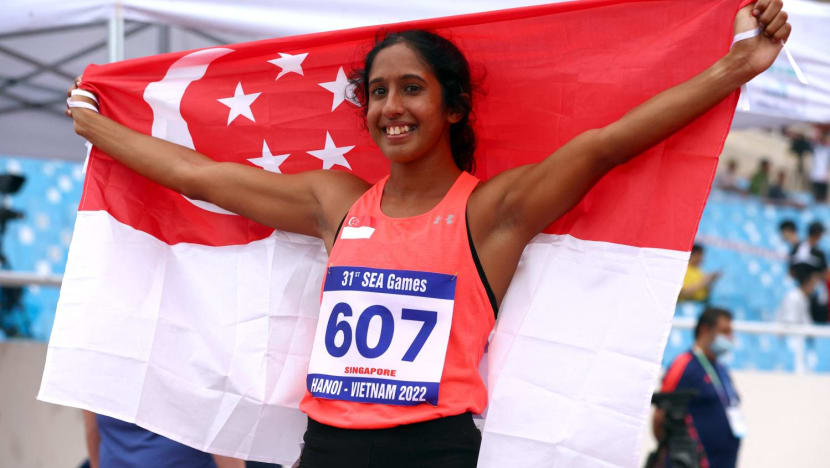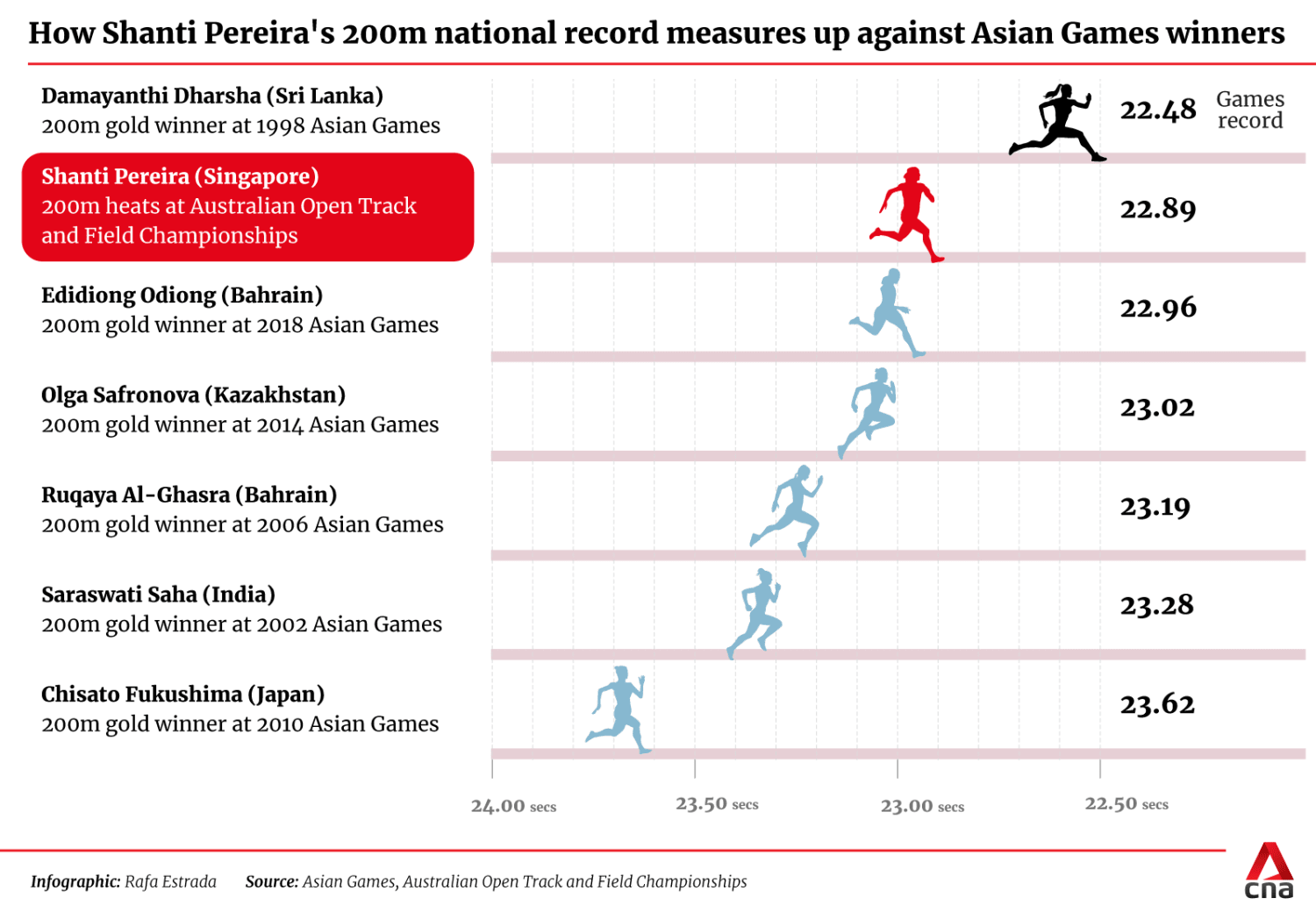Talent, dedication and a good foundation key to Shanti Pereira's success, say former Singapore track stars
Shanti Pereira's success has been the product of years of work, as well as raw ability, says former national sprinter UK Shyam.

Shanti Pereira after the 200m finals at the SEA Games in Vietnam on May 14, 2022. (Photo: SportSG/Jeremy Lee)
SINGAPORE: Sprinter Shanti Pereira's recent record-breaking exploits are a testament to her talent, but other factors such as her strong foundation in the sport and training full-time have been key, Singapore's former track stars said.
The 26-year-old has rewritten her 100m national mark thrice this year and her 200m national mark twice.
Most recently last Sunday (Apr 4), she set her third national record in as many days as she clocked 22.89s in the women’s 200m heats at the Australian Track and Field Open in Brisbane.
Pereira’s new record time would have been enough for her to win gold at the last five editions of the Asian Games.
Former national sprinter UK Shyam described Pereira's achievements as a "landmark achievement" for Singapore sprinting.
Based on World Athletics' records, Pereira's 22.89s put her as the 18th fastest worldwide in 2023 and was the second-fastest time for an Asian woman in 2022.
"I cannot overstate the magnitude of what she has done," said Shyam, who holds the men's 100m national record of 10.37s, which he clocked twice in 2001.
This sentiment was echoed by former national athlete Dipna Lim-Prasad. "I feel honestly quite mind-blown (by what she has achieved) that I am still digesting it," she told CNA.
What has been impressive is Pereira's consistency, said Lim-Prasad.
"That not just speaks of physical fitness, but the fact that her mental strength is strong enough, and she has experience to manage that excitement, and maybe even nerves.
"Regardless of the wind conditions, headwind, tailwind, no matter what – she’s been great."
Former Singapore sprinter Glory Barnabas described Pereira's performances as "amazing" and inspirational to the next generation of sprinters.
"It’s good for Singapore athletics, because this is creating an interest among other sprinters," said Barnabas, who was the only local athlete to win gold in the 200m at the SEA Games (1973) until Pereira's 2015 win.
"They would be looking up to her as a champion, and maybe trying their best to watch her training or if they happen to know her personally to get some answers from her … and that will be very good for them."
IDEAL CONDITIONS
Last November, it was announced that Pereira would join the Sports Excellence Scholarship programme, which supports athletes headed to major competitions.
And being able to train full-time has no doubt benefited her, say those who CNA spoke to.
Focusing on training, recovery and performance allows an athlete to be more intentional in their preparation, rather than be beholden to work schedules, said Lim-Prasad.
"If you're always exhausted, your body is not going to be able to adapt from the training or even be ready enough to put in the intensity needed. And then that might lead to an injury or very simply a workout which is not a good quality one. (It is eliminating) all of that plus removing the ample load of having to worry about other work," she explained.
All of these small things make a "huge difference", said the women's 400m and 400m hurdles record holder. "It’s a ripple effect, it gives her more capacity to then pour into track."
Speaking to CNA, Pereira said it was tough to juggle work and training in the past.
"I did have the time to train but (the) quality wasn't there because I'm just tired from working the whole day, and then showing up to training after that," she said.
"It could also get a bit hectic. Sometimes you're not sure what time you will finish (work), and then you show up at the track way later than you wanted to – you’re just not physically or mentally ready for the session which is not ideal because you want to be at your best every day."
Her coach Luis Cunha also stressed the importance of being an athlete 24/7.
"All the decisions that you take during the entire day need to be (about being) an athlete. The things that you eat, the times that you eat and drink, the recovery ... and the number one recovery is sleep. You need to have a routine in terms of sleep that allows you to recover," he told CNA.
Not having to work has allowed Shanti to focus more on these, he said.
"Now (the goal is for her) to continue on that pathway. It is not going to be easy, because this pathway demands from her to be very discipline and do things that are not easy."
Pereira's performances in 2023 have built on a strong 2022 where she registered national records in both the 100m and 200m, winning a gold (200m) and silver (100m) at the SEA Games.
"She's had such a successful season at SEA Games, even while juggling work," said Lim-Prasad.
"That really speaks volumes about the training that she's been putting in, and her as an athlete and her talent. But I think just being able to rest and just fully focus just accelerated her trajectory or gave her a bit more breathing room."

Pereira's month-long training camp in New Zealand before she headed to compete in Australia also provided the ideal conditions for her strong performances.
"They created a very good environment for her to excel – the location of the training camp was very well-picked," said Lim-Prasad.
This coupled with generally good weather and a strong field of athletes in races would have proved beneficial, she added.
"Everything just kind of came together … It created a really good environment for me to train and compete. The atmosphere at all the meets was really nice. Everyone was super supportive of all the athletes – not just their home-based ones," added Pereira.
She noted that training with top New Zealand sprinter Zoe Hobbs was also helpful.
"Getting to do sessions with her was really amazing, it helped me learn a lot," said the Singaporean of Hobbs, who earlier this year smashed the Oceania 100m record with a time of 10.97s.
"By going to Australia, New Zealand, she's had that opportunity consistently (to compete with high-level athletes) and that's what will bring down the times," added Shyam.
A STRONG FOUNDATION
At the same time, Shyam added that Pereira's success has been the product of years of work.
"For me the larger issue is that she has remained consistent in terms of the quality of training and the quality of exposure to world-class meets since I think 12 years old," said Shyam, who added that this would have begun from her time at the Singapore Sports School as a young athlete.
"In terms of the disposition, the skills that you hone, and all that – it’s many, many, many years in the making."
Pereira picked up the sport in primary school, before following in the footsteps of her sister Valerie who was a sprinter at the sports school.
Added to this is the raw ability which Pereira possesses, said Shyam, who described her as a "once in 30 years" type of talent.
"You can have all these things in place but the person obviously has to have to have the raw talent," he added.

Another contributing factor to Pereira's growth has been Cunha's coaching, said Lim-Prasad.
"Luis is kind of great, we always call him magic because he is able to tailor the training to the individual athlete and he really goes above and beyond," said Lim-Prasad, who was also coached by Cunha.
"He's the one that who helped me realise my potential and helped me change my perspective, when it comes to just racing and competing," added Pereira.
While 2023 will be a packed year – SEA Games, Asian Athletics Championships, World Athletics Championships and Asian Games – for the 26-year-old, things just feel different, she said.
"Last time I would compete against all these people, but it's always like I’m behind, and I'm trying my best to keep up. But (now) it's like, I go in without even worrying about that factor.
"I never thought I would be in a position where I can say that I can run with these girls. So I'm just really enjoying that feeling, just being happy and hungry and competing."













